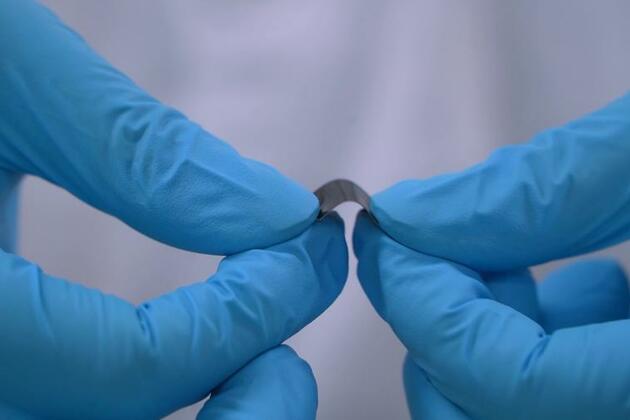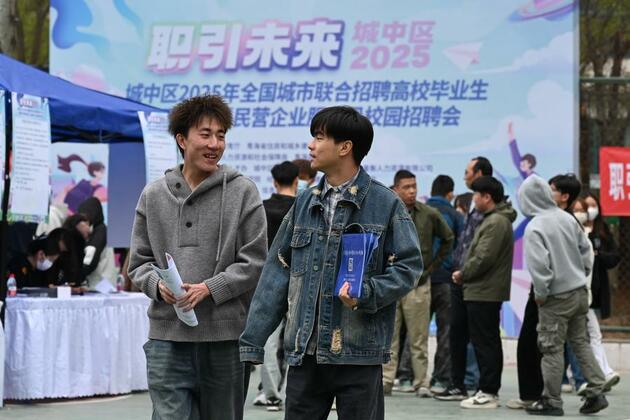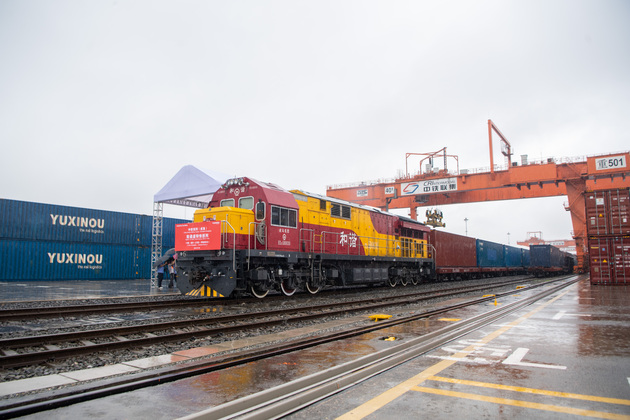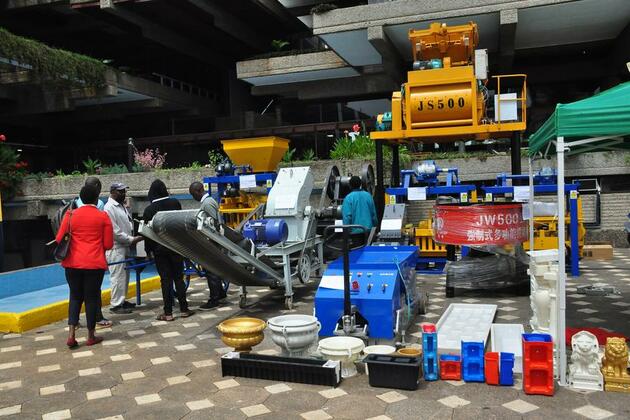Fingerprint of innovation -- a quest of China's e-skin startup to success
Xinhua
09 Jul 2025, 15:46 GMT+10

by Xinhua writers Yi Ling and Hou Wenkun
WUHAN, July 9 (Xinhua) -- Imagine a robotic hand delicately lifting a cube of silken tofu without leaving a dent -- a task most humans would struggle to master. This feat of precision, demonstrated at Wuhan Huaweike Intelligent Technology Co., Ltd. in central China's Hubei Province, hinges on a revolutionary technology: e-skin.
Covering just one square centimeter on the robotic fingertip are nearly 100 tiny "touch points," or micro-sensing points, as Huaweike Chief Product Officer Ding Xiaotian explained. "The e-skin precisely controls pressure distribution to avoid crushing the tofu."
This flexible sensor network grants humanoid robots something remarkably human -- a sense of touch.
Yet, behind this technological triumph lies a story of immense risk and perseverance.
Just three years ago, the company's e-skin project was a "money-losing venture," said Huaweike CEO Zhu Xiaohui. An initial client project for an interactive robot touch sensor started with just 500,000 yuan (about 69,930 U.S. dollars).
"We lost the shirts off our backs," Zhu recalled candidly. "The investment required was enormous."
Ding, leading the technical charge, encountered a daunting reality.
"There were no materials ready, no equipment available, and no established standards," he said describing their "three-No" starting point.
What began as a two-month, five-person project ballooned into a two-year marathon involving 50 specialists across flexible sensing, materials science, and manufacturing processes. Huaweike gambled an additional 2 million yuan of its own capital.
MIXED FORCES and MILLION-CYCLE TESTS
A breakthrough required unexpected collaboration. One June night, Ding welcomed a critical ally, Professor Li Min from Wuhan-based Huazhong University of Science and Technology. Huaweike created a dedicated lab and office space for university academics and students, cultivating what Ding called a "mixed forces" approach whenever hitting technical walls.
"Previously, whether it was a research paper or a patent, it rarely translated into real-world application. This new industry-academia model helps us understand genuine customer needs and industry pain points, making our work highly relevant to industry," said Li.
After two years of relentless effort, Huaweike engineered an electronic skin that was both exquisitely sensitive and remarkably durable.
The first generation could detect weights down to 10 grams. "The latest generation can sense as little as 1 gram and has passed 1 million press-and-release tests," said Ding proudly.
FROM LAB TO FACTORY
Scaling this lab marvel into mass production presented the next challenge. Demand for the company's e-skin exploded -- from 200 units annually to 200 units monthly. The solution lay hidden within its factory of specialized "printers."
In a Huaweike workshop, rolls of blank material entered machines and rolls embedded with intricate sensor patterns emerged. This "roll-to-roll" printing technology was key, said Zhu.
The technology utilizes new "e-ink" materials and employs the company's self-developed roll-to-roll printing equipment to print circuits as required for electronic skin, explained Zhu, adding that it enables higher precision, larger size, and increased manufacturing efficiency.
The seed for this breakthrough was already planted a decade earlier. Founded in 2011 by Xiong Youlun, an academician of the Chinese Academy of Sciences, Huaweike began life developing flexible radio frequency identification (RFID) tags. Over 10 years, it perfected roll-based manufacturing equipment.
Facing the e-skin challenge, they redesigned this machinery for intricate, continuous printing, including developing custom "e-ink." Huaweike now holds over 100 patents and helped shape eight industry standards.
FINGERTIPS TO BLADES
Perhaps the most striking validation of their technology arrived not from a lab robot, but atop the chilly heights of Huanglongshan Wind Farm.
Mounted directly onto turbine blades, Huaweike's e-skin now detects dangerous ice buildup, said He Lifu, an engineer at the Wuhan science and innovation park of China Three Gorges Corporation.
"The sensors adhere directly to the blade surface to monitor the ice thickness. This guides on-site operators to safely restart turbines faster, minimizing downtime and power generation loss," said He.
Ice build-up has long been a critical industry hazard, reducing efficiency while making human inspection perilous.
The ultra-thin flexible e-skin can conform completely to the surfaces of the blades, resulting in zero wind resistance. This addresses the issue of installation reliability of traditional rigid sensors without compromising the energy efficiency of the turbine, said Zhu.
In addition, by incorporating ultra-thin flexible power supply, control, and communication modules within the ice monitoring sensor, the system achieves passive wireless monitoring and signal transmission, resolving the wiring challenges of traditional sensors on the blades and reducing lightning strike risks, he added.
A WIDER MAP OF DEVELOPMENT
E-skin remains a novel market and robot demand alone can not offset R&D costs. Huaweike thus explored broad applications like automotive manufacturing and healthcare to achieve sustainable cash flow, said Zhu.
The company has accelerated production. In 2024, its e-skin equipped around 200 humanoid robots. In the first quarter this year, orders neared 1,000 units. Now, a production line capable of 2 million automotive-grade e-skin units annually is operational, marking Huaweike as one of the few of its peers in China to transition from R&D and small-batch delivery to mass production, according to Zhu.
Supportive government policies have fueled this growth.
Hubei Province last year enacted its plan for accelerating future industries (2024-2026), bolstering innovation platforms. The provincial capital Wuhan recently specifically launched a three-year action plan for humanoid robots, offering rent-free space, R&D incentives up to 1 million yuan for each project, subsidies for manufacturer-supplier procurement, and venture capital funds.
"These measures grant us greater development space," Zhu said.
Now employing nearly 300 people, over 100 in R&D, Huaweike secured a valuation of 620 million yuan after its first funding round. It eyes an output value of 250 million yuan by 2025.
"We aim to embed our flexible smart sensing into cars, appliances, furniture and beyond, creating the new data perception foundation of the AI era," said Zhu.
 Share
Share
 Tweet
Tweet
 Share
Share
 Flip
Flip
 Email
Email
Watch latest videos
Subscribe and Follow
Get a daily dose of Manila Metro news through our daily email, its complimentary and keeps you fully up to date with world and business news as well.
News RELEASES
Publish news of your business, community or sports group, personnel appointments, major event and more by submitting a news release to Manila Metro.
More InformationAsia Pacific
SectionBeijing hits back at EU with medical device import curbs
HONG KONG: China has fired back at the European Union in an escalating trade dispute by imposing new restrictions on medical device...
Trump signals progress on India Trade, criticizes Japan stance
WASHINGTON, D.C.: President Donald Trump says the United States could soon reach a trade deal with India. He believes this deal would...
Fingerprint of innovation -- a quest of China's e-skin startup to success
by Xinhua writers Yi Ling and Hou Wenkun WUHAN, July 9 (Xinhua) -- Imagine a robotic hand delicately lifting a cube of silken tofu...
China rolls out sweeping employment push for record number of college graduates
BEIJING, July 9 (Xinhua) -- China has unveiled a tiered strategy to boost employment prospects for the nation's 2025 college graduates,...
CHINA-CHONGQING-NEW FREIGHT TRAIN SERVICE (CN)
(250709) -- CHONGQING, July 9, 2025 (Xinhua) -- The China-Europe Railway Express (Chengdu-Chongqing) Middle Corridor Ultra-Express...
(Hello Africa) Kenyan visitors flock to Chinese products at annual trade expo
Over 100 exhibitors, including more than 80 from China, are showcasing their products at the 10th edition of China Trade Week, which...
International
SectionPutin fires transport chief, later found dead in suspected suicide
MOSCOW, Russia: Just hours after his sudden dismissal by President Vladimir Putin, Russia's former transport minister, Roman Starovoit,...
Thousands gather in Himalayas as Dalai Lama celebrates 90th birthday
DHARAMSHALA, India: The Dalai Lama turned 90 on July 6, celebrated by thousands of followers in the Himalayan town of Dharamshala,...
Fans perform WWII-era Fascist salute at Marko Perković’s mega concert
ZAGREB, Croatia: A massive concert by popular Croatian singer Marko Perković, known by his stage name Thompson, has drawn widespread...
U.S. Treasury Secretary says Musk should steer clear of politics
WASHINGTON, D.C.: Elon Musk's entry into the political arena is drawing pushback from top U.S. officials and investors, as his decision...
TikTok building U.S.-only app amid pressure to finalise sale
CULVER CITY, California: TikTok is preparing to roll out a separate version of its app for U.S. users, as efforts to secure a sale...
Trump defends use of 'Shylock,' citing ignorance of slur
WASHINGTON, D.C.: President Donald Trump claimed he was unaware that the term shylock is regarded as antisemitic when he used it in...












